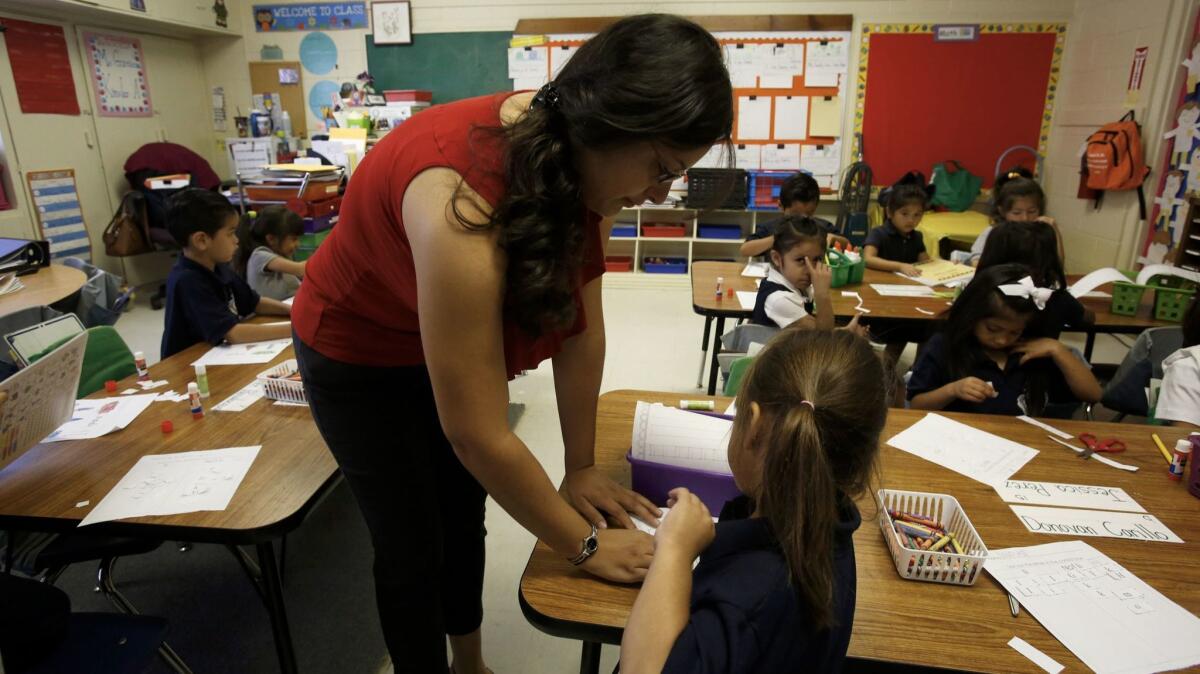Three L.A. charter schools could be shut down, largely because of their practice of bringing in teachers from Turkey

Three Los Angeles charter schools could be shut down, largely because of their practice of bringing in teachers from Turkey, The Times has learned.
The schools are part of a group of 10 campuses operated by locally based Magnolia Public Schools, which has relied heavily on using temporary work visas to import Turkish teachers.
The three charters now under review have five-year operating agreements that are expiring, and the L.A. Unified School District must either approve or deny their renewal applications. The official word, with no accompanying explanation, reached their campuses by email Tuesday afternoon: School district staff will recommend denial.
The Board of Education is expected to vote next Tuesday on the recommendations for Magnolia Science Academy 1 in Reseda, Magnolia Science Academy 2 in Van Nuys and Magnolia Science Academy 3 in Carson.
Magnolia’s schools have attracted increased attention in the wake of a failed coup in Turkey in July. The government of Turkish President Recep Tayyip Erdogan has accused Turkish cleric Muhammed Fethullah Gulen of masterminding the revolt. Erdogan claims American charter schools with Turkish ties supported — and even helped fund — Gulen’s alleged activities.
L.A. Unified has not yet released its rationale for recommending that the schools’ renewal requests be denied. But sources inside and outside the district make it clear that one major issue is Magnolia’s foreign workers, most of whom came in to teach.
The school group applied to bring in 138 teachers from abroad, almost all from Turkey, and 97 eventually worked for Magnolia. Thirty-seven still do. As required by law, Magnolia covered the visa-related costs, which it estimated at about $3,000 per employee, and chose to pay for the visas of spouses and children.
L.A. Unified estimated the total cost of that effort at about $929,000, according to Magnolia Chief Executive Caprice Young, the former L.A. school board president who took over Magnolia in 2015.
Young said she ended the practice, though she has brought in a Chinese citizen to teach Chinese.
L.A. school board president Steve Zimmer, however, says Magnolia’s past actions remain a problem. Magnolia never indicated it intended to import teachers en masse, Zimmer said, when before the Board of Education for approval.
“The role of an authorizer includes making sure that a charter follows the instructional and business practices outlined in its petition,” said Zimmer, who declined to discuss the district’s internal report.
The significance of any alleged ties to Gulen is a matter of intense debate. The cleric, who lives in self-imposed exile in Pennsylvania, has denied involvement in the coup. And Turkish-associated charter groups, including Magnolia, have denied financial or management ties with each other or with him.
Magnolia’s Turkish employees agreed to be interviewed only on condition of anonymity, out of fear that family members back home could be targeted in a wide-ranging crackdown on dissidents and suspected Gulen followers. Magnolia governing board member Umit Yapanel recently stepped forward as an admirer of Gulen, he said, to emphasize the peaceful intentions of like-minded people.
In discussing whether the schools should be renewed, L.A. Unified officials will bring up the spending of public education funds on the visas, the employment of foreign nationals over American workers and the failure to disclose the hiring strategy, said district sources who were not authorized to speak on the record. The work visas, known by the designation H-1B, are supposed to be used only when no qualified American job seekers can be found.
The written report mostly will focus on more traditional issues for a charter-school review, accusing Magnolia of poor financial management and inconsistent or incorrect internal policies, sources said. The visa issue is embedded in the allegation that Magnolia failed to turn over all requested documentation, which Young disputes.
Young said she doesn’t believe Magnolia’s hiring or spending violated any laws. If it did, she said, “the cure is not to close the charter but to fine the schools or fine the individuals who made those decisions and even to prosecute them.”
Students, she said, shouldn’t be harmed, by shutting down campuses “that have prepared hundreds of underserved students to attend and succeed in college.”
One immigrant teacher, who requested that his name not be used to protect his family in Turkey, said he heard about an opening at Magnolia through a Turkish social network. At the time, he was in the U.S. on a student visa, learning English.
Charters are independently operated and exempt from some rules that apply to traditional campuses. Until recently, Magnolia’s board and management were dominated by Turkish immigrants. Other charter groups across the country were structured similarly — and, like Magnolia, brought in Turkish teachers. Some also hired Turkish contractors to provide various services, including construction and curriculum development.
The teacher who spoke about how he came to Magnolia said he has worked there for about a decade and helped developed a prize-winning robotics program. He’s now married with two children and plans to build a future in this country.
Work visas can be extended for six years only, so Magnolia sponsored him for a green card, which allows him to work here indefinitely.
“If you go to the trouble of sponsoring a teacher who turns out to be a great teacher,” Young said, “why wouldn’t you follow through and help them stay?”
Twitter: @howardblume
MORE EDUCATION NEWS
At the University of Redlands, guys meet to parse what it means to be men
How a farm at an L.A. continuation school became a refuge for both students and animals
More to Read
Sign up for Essential California
The most important California stories and recommendations in your inbox every morning.
You may occasionally receive promotional content from the Los Angeles Times.











